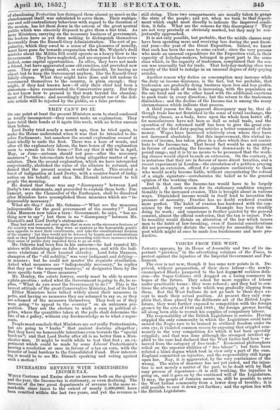THEY CAN'T DO IT.
the one point at least the present Ministers seem to stand confessed as totally incompetent—they cannot make an explanation. They have tried their hands at it again this week, with no better success than before.
Lord Derby tried nearly a month ago, then he tried again' to make the House understand when it was that he intended to dis- solve Parliament; but somehow the second explanation seetned at least wholly to undo the first. There was a haze of words, and after all the explanatory labour, the bare bones of the explanation seem to remain in this form—" Not say that it will be in April, May, or June—autumn should not pass—after the necessary measures " ; the intermediate text being altogether matter of spe- culation. Then the second explanation, which we have interpreted conjecturally, abolished the value of the allusion to autumn and denied that the present session would be short. This created a burst of indignation at Lord Derby, with a counter-burst of indig- nation on his behalf; and then Mr. Disraeli intervened to tell people the meaning.
He denied that there was any " discrepancy " between Lord Derby's two statements, and proceeded to explain them both : Par- liament, says the Chancellor of the Exchequer, shall be dissolved after Ministers have accomplished those measures which are "in- dispensably necessary."
What are they ? asks Mr. Osborne—" What are the measures indispensable for the good government of the country P " Lord John Manners now takes a turn : Government, he says, "has no- thing new to say " • but there is no " discrepancy " between Mr. Disraeli's and Lord Derby's statements—
They had said over and over again that as soon as the tfeeessary business of the country was transacted, they were as anxious as the honourable gentle- men opposite to meet their constituents, and take the constitutional decision of the country : but they would not be deterred by taunts and recriminations such as they had heard that night from proceeding with those ineasures which their sense of public duty impelled them to go on with.
Mr. Osborne had been free in his sarcasm—he had taunted Mi- nisters with obtaining place on false pretences, and with the ludi- crous violations of their boasted chivalry. Lord John Manners, champion of the "old nobility," was very indignant and defying— in manner but he could not muster the requisite elucidation. Asked- what measures are "indispensably necessary," he replies that they are "the necessary business," or designates them by the more specific term "those measures."
Mr. Tifenley, the astute lawyer, surely must be able to answer a_plain question : asked what the Government is going to do, he re- plies, "What do you want the Government to do ? ' This is the newest attitude of the great Conservative Ministry, last of its line ! Either Ministers have talked widely about their measures in petto, and having no measures they are ashamed to say so, or they are ashamed of the measures themselves. They look as if they were going "to appeal to the country" on an unknown pro- position. They ask the electors to work a sum in political al- gebra, where the quantities taken at the polls shall determine the fate of an x polioy, without any foreknowledge as to what z repre- sents.
People must conclude that Ministers arc not really Protectionists, but are going to " bnrke " that ancient doctrine altogether ; that they have no honourable intentions even towards the "special burdens"; and that Lord Derby after all is no better than a Man- chester man. It might be worth while to test that fact ; an ex- periment which could be made by some Liberal Protectionist's moving a resolution at once in favour of a tax on corn, with the transfer of local burdens to the Consolidated Fund. How interest- ing it would be to see Mr. Disraeli speaking and voting against such a motion !


























 Previous page
Previous page